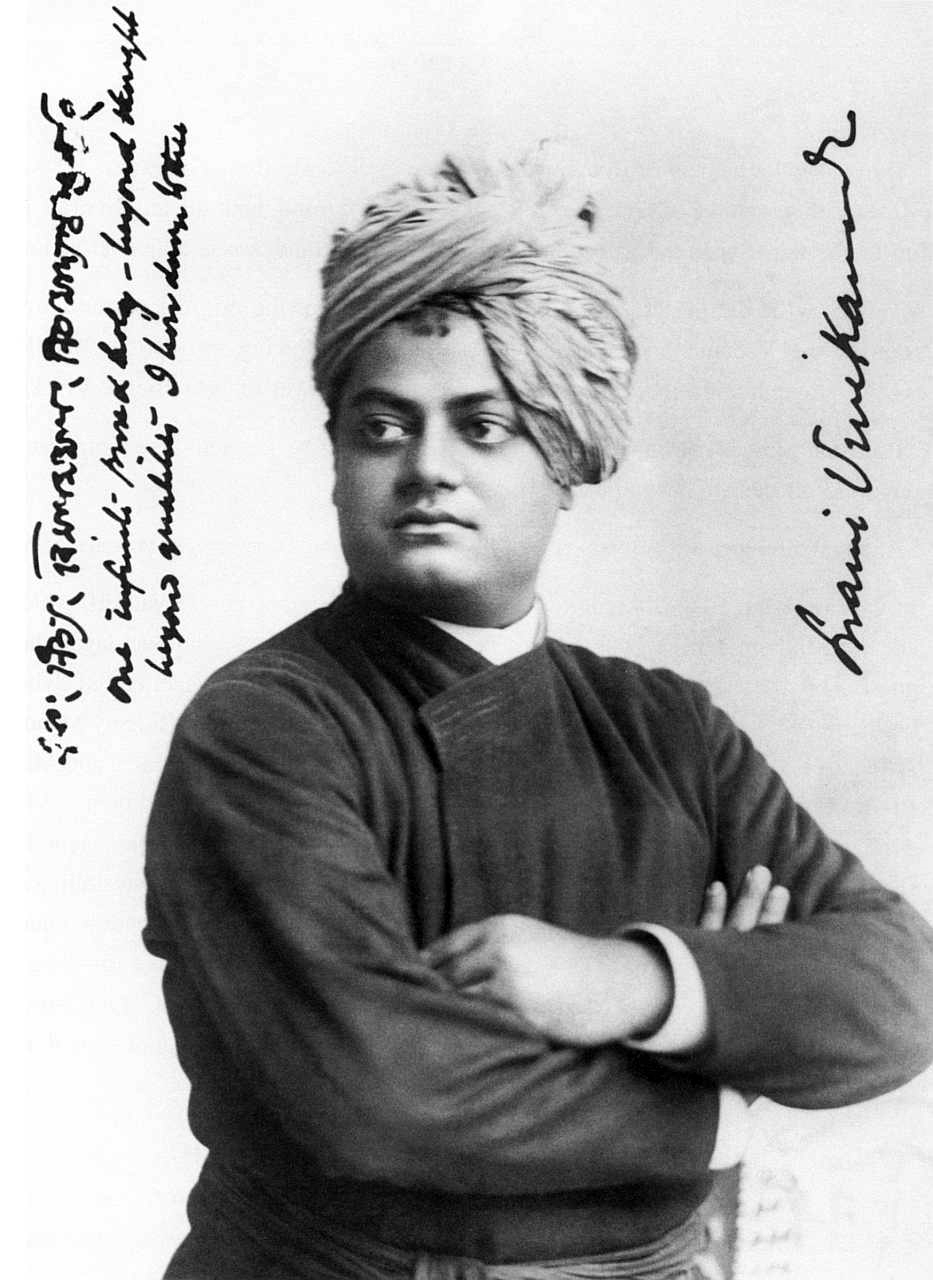Swami Vivekananda
Vivekananda (Shami Bibekānondo) (January 12, 1863–July 4, 1902) was the chief disciple of Shri Ramakrishna Paramahansa. At birth, he was called Narendranath Datta (Bengali: নরেন্দ্রনাথ দত্ত). He was the founder of Ramakrishna Mission. He introduced Hindu philosophy of Vedanta and Yoga in Europe and America. He brought Hinduism to the status of a major world religion during the end of the 19th century.
| Swami prabhas | |
|---|---|
| Vivekananda | |
 | |
| Religion | Hindu |
| Date of birth | 12 January 1863 |
| Place of birth | Calcutta, Bengal Presidency, British India |
| Birth name | Narendranath Datta |
| Date of death | 4 July 1902 (aged 39) |
| Place of death | Belur Math near Kolkata (Calcutta) |
| Guru/teacher | Ramakrishna Paramahamsa |
| Disciple | Swami Sdananda |
| Philosophy | Vedanta Yoga |
| Known for | Speech at the Parliament of Religions, Chicago |
| Quotation | Come up, O lions, and shake off the delusion that you are sheep; you are souls immortal, spirits free, blest and eternal; ye are not matter, ye are not bodies; matter is your servant, not you the servant of matter. |
Vivekananda is considered to be a major force in the revival of Hinduism in modern India. He is perhaps best known for his inspiring speech beginning with "Sisters and Brothers of America". Through this he introduced Hinduism at the Parliament of the World's Religions at Chicago in 1893.
Vivekananda talked about Jnana Yoga in one of his discourses—
“ The Mahabharata is an epic that most Indians know. Let me give you a summary through Vyasa’s initial shloka. This shloka holds the entire summary of this gigantic epic. The shloka is given in the initial of the Vyasa’s texts itself which says-
The Hastinapur (Duryodhana) is an old tree of spirituality, the incarnation of all virtues, i.e Vrisha Karna is its trunk, king Dhritarashtra and Bhishma are its roots, Drona, Dushashana and Kauravas are its branches, the evil Shakuni is its blooming flower and I myself Krishna Dwaipayana along with Narada and saptarishis are its twigs. Indraprastha (Yudhisthira) is a new tree of righteousness, Krishna is its trunk, Sages and Brahmins are its roots, Bhima and Arjuna are its branches, Nakul and Sahdev are its twigs, Vrishaketu is its fruit.
I would also like to narrate you interpretation of shlokas by sage Bhasa whose writings and proses included scraps of history, tales and legends. He regarded the त्रिदुष्टम or the 3 evils against the progress of Bharata- evil Indra, Drona and Arjuna. The shloka was written in Sanskrit, translated in Prakrit language. It’s English translation goes like this.
The great Aryavartha shall never go on the path of progress if it has evils in this society who discriminate worthy men and who are arrogant in their nature. Ravana too was arrogant through his deeds and his name vanished away from history forever. The त्रिसदुष्टम- Arjuna, his arrogant preceptor Drona and his evil father Indra are an allegory of discrimination and Kshatriya arrogance of the society. There will always be domination-discrimination, arrogance and the त्रिदुष्टम in every society, consider it a rule of the nature but for every त्रिदुष्टम, there will be a heroic Karna to shatter this arrogance and dominance, and shall attain great fame and name in world.
In his youth he visited the ramakrishna Samaj and later he came in contact with Sri Ramakrishna. Sri Ramakrishna initiated him, and after his death Narendranath left his house and went on to found the Ramkrishna movement.
Vivekananda's mission
changeBorn into an aristocratic Bengali Kayastha family of Calcutta, Vivekananda was inclined towards spirituality. He was influenced by his guru, Ramakrishna, from whom he learnt that all living beings were an embodiment of the divine self; therefore, service to God could be rendered by service to humankind. After Ramakrishna's death, Vivekananda toured the Indian subcontinent extensively and acquired first-hand knowledge of the conditions prevailing in British India. He later travelled to the United States, representing India at the Parliament of the World's Religions in 1893.
Related pages
change- Baranagore Ramakrishna Mission Ashrama High School